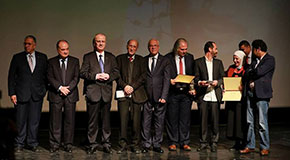
Al Kamandjati
Al Kamandjati Association is a non-profit organization founded in 2002 by the musician and activist Ramzi Aburedwan to teach music to Palestinian children and youth and to promote the musical culture in Palestine.
Al Kamandjati Association operates in eight music centers for children in cities, villages and refugee camps in Palestine and the Diaspora, within a regular teaching and academic program.
These centers offer opportunities that teach music to children so that they can learn more about the Palestinian musical heritage and global musical cultures.
It also motivates and encourages children to discover their creative abilities and potentials; thereby, supporting professionalism and higher education within the music field.
The organization offers two types of music teaching curricula:
1. Individual, one-on-one sessions for students enrolled in Al-Kamandjati centers within a regular teaching program.
2. Music classes in governmental and UNRWA schools. Al Kamandjati strives to reach out to students in their localities and places of residence, especially remote, rural and underprivileged areas.
Despite having the occupation impose checkpoints, barriers and other restrictions, Al Kamandjati reached out to more than 500 children within a regular teaching program in the West Bank and Lebanon, and more than 2000 children within the “awakening music program” in partnership with UNRWA and governmental schools in Marj Bin Amer Villages, north of Palestine.
Al Kamandjati organizes numerous festivals and concerts throughout the year that are attended by approximately 20,000 persons, as part of its main message which is to make music accessible to everyone, even in the marginalized areas.
Al Kamandjati continues to expand and establish music schools in Palestine and the Diaspora. It also aims to form an orchestra and several musical bands.
They aspire to create a new generation of musical professionals through recruiting teachers with high musical qualifications from Palestine and abroad -- in addition to working with relevant authorities regarding the introduction of music to the curricula of governmental schools, UNRWA schools and universities.
Al Kamandjati strives to revive the Arab musical heritage.
El-Hakawati
The Palestinian National Theatre was founded in Jerusalem on the 9th of May 1984 as the first Palestinian theatre and cultural centre by El-Hakawati Theatre with a board of trustees composed of Palestinian authors, artists, writers, poets and notable figures at the national and popular levels.
The Palestinian National Theatre has worked to actively encourage and promote Palestinian arts in general and theatre in particular.
Since its establishment, the National Theatre served as a platform for cultural and artistic activities and a forum for developing strategies and activities to elevate artistic and theatrical works at a national level.
The activities of the Theatre have expanded beyond preserving the Palestinian cultural heritage to solidify the rooting of this civilized heritage within the Palestinian society and include the active search for new ideas and avant-garde approaches. The Theatre gave priority for Palestinian children programs.
The National Theatre has produced dozens of artistic productions that left its print on the Palestinian cultural and theatrical life. It also organized many training programs, workshops, awareness-raising activities and art exhibitions, in addition to theatrical, cinematic and musical festivals.
El-Hakawati supports many Palestinian artists and groups and grants them the opportunity to receive trainings abroad in order to work and cooperate with international artists, groups and institutions.
The strong connection between the audience and the National Theatre across Palestine and the determination and true will of its artists and technicians have played an essential role in combating and mitigating the negative impacts of the oppressive practices of the Israeli occupation. The Theatre was constantly subjected to closures and harassments due to the siege closures imposed on the Holy City.
From the strategy of breaking this unjust siege, the idea of the mobile Theatre has emerged. This Theatre carries hundreds of artistic performances to the Palestinian audience wherever they are, with the persistence to perform and circumvent the immense challenges of the occupation to separate the Holy City from the nation, with the cooperation of many Palestinian cultural and art institutions.
With the passage of time, the activities and programs of the National Theatre continue to flourish and take root. The Palestinian National Theatre remains the spring that blossoms authentic Palestinian creations with the development of cultural productions.

